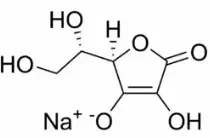How Does Sodium Ascorbate Powder Help with Skin Health?
Sodium Ascorbate powder is a non-acidic form of vitamin C that has gained attention in skincare for its benefits. This stable, water-soluble derivative offers better bioavailability than ascorbic acid, making it excellent for improving skin appearance and health. As an antioxidant, Sodium Ascorbate powder fights free radical damage, enhances collagen production, and provides many skin benefits we'll explore in this article.

What Makes Sodium Ascorbate Powder Different from Regular Vitamin C for Skin?
The Unique Chemical Structure of Sodium Ascorbate Powder
Sodium Ascorbate powder differs from regular ascorbic acid in its chemical composition. While ascorbic acid is highly acidic with a pH of 2.0-3.0, Sodium Ascorbate powder is a neutral salt with a pH of approximately 7.0-7.5. This makes it gentler on the skin, especially beneficial for sensitive skin types. Its molecular structure allows better skin penetration without causing irritation often associated with pure ascorbic acid. The sodium component enhances stability, making it less prone to oxidation when exposed to air and light. This improved stability ensures the product maintains its effectiveness longer, providing consistent results for skin health.
Absorption and Bioavailability Advantages of Sodium Ascorbate Powder
Absorption and bioavailability are crucial for skincare efficacy, and Sodium Ascorbate powder excels in this area. Unlike regular vitamin C with limited penetration due to its acidity and molecular size, Sodium Ascorbate powder offers superior absorption. Its neutralized pH allows it to pass through the skin barrier more efficiently, reaching deeper layers where it promotes collagen synthesis and cellular repair. Studies show Sodium Ascorbate powder maintains high bioavailability in the skin for extended periods. Its water-soluble nature makes it compatible with various skincare formulations, enhancing its versatility. This superior absorption profile means even lower concentrations can deliver more vitamin C to skin cells than higher concentrations of less bioavailable forms.
Skin Sensitivity and pH Considerations with Sodium Ascorbate Powder
For those with reactive or sensitive skin, pH balance is critical when selecting skincare ingredients. Sodium Ascorbate powder's neutral pH causes minimal disruption to the skin's natural acid mantle, which typically maintains a pH between 4.5 and 5.5. This reduces the risk of irritation, redness, and discomfort that some experience with acidic vitamin C derivatives. The gentle nature of Sodium Ascorbate powder makes it suitable for use with other active ingredients without increasing sensitivity. Many dermatologists recommend it for patients with conditions like rosacea or eczema, who might otherwise be unable to use vitamin C. This inclusivity has contributed to the growing popularity of Sodium Ascorbate powder, as it allows more individuals to benefit from vitamin C's skin-enhancing properties.
How Can Sodium Ascorbate Powder Combat Signs of Aging?
Collagen Production Stimulation through Sodium Ascorbate Powder
Sodium Ascorbate powder fights skin aging by stimulating collagen production, which is crucial for maintaining skin elasticity and firmness. Natural collagen synthesis decreases about 1% yearly after age 20, leading to wrinkles and sagging. Sodium Ascorbate powder serves as a cofactor for enzymes essential for stabilizing collagen molecule structure. Research shows topical application can increase collagen production by up to 50% in some skin types. Its neutral pH allows it to penetrate to the dermis where collagen synthesis occurs. Additionally, it helps regulate collagen quality, ensuring proper cross-linking of fibers for optimal skin strength. Regular application leads to visibly firmer skin with reduced fine lines and improved texture.
Antioxidant Protection Against Free Radical Damage
Sodium Ascorbate powder's exceptional antioxidant capacity is a powerful weapon against premature aging. Environmental aggressors like UV radiation and pollution generate free radicals that attack skin cells, causing oxidative stress and accelerated aging. Sodium Ascorbate powder neutralizes these reactive oxygen species before they damage cellular structures and DNA. Its molecular structure effectively donates electrons to stabilize free radicals without becoming a pro-oxidant itself. Studies show it provides protection against both UVA and UVB radiation-induced damage, complementing sunscreen protection. Regular application creates a reservoir effect in the skin, providing antioxidant protection for up to 72 hours—longer than other antioxidants. This prolonged protection makes it valuable in anti-aging regimens.
Brightening and Evening Skin Tone with Sodium Ascorbate Powder
Sodium Ascorbate powder addresses uneven skin tone and hyperpigmentation, another prominent sign of aging. As we age, melanin production can become irregular, resulting in age spots and discoloration. Sodium Ascorbate powder inhibits tyrosinase, the enzyme responsible for initiating melanin production. Unlike harsh skin lighteners, it achieves brightening without toxicity concerns or rebound hyperpigmentation risks. Its gentle nature makes it suitable for long-term use, gradually reducing existing dark spots while preventing new ones. Furthermore, it promotes cellular turnover, helping fade surface discoloration by accelerating the shedding of pigmented cells. Many users report noticeable improvements in skin tone within 4-8 weeks of consistent application. This comprehensive approach makes Sodium Ascorbate powder indispensable for maintaining a youthful, even-toned complexion.

Is Sodium Ascorbate Powder Effective for Treating Acne and Blemishes?
Anti-inflammatory Properties of Sodium Ascorbate Powder for Acne
Sodium Ascorbate powder offers anti-inflammatory benefits that make it effective for treating inflammatory acne. Unlike traditional treatments that can cause dryness and irritation, it addresses inflammation without compromising the skin barrier. It works by inhibiting the nuclear factor kappa B pathway, which regulates inflammatory responses. This helps reduce redness, swelling, and discomfort associated with active acne. Additionally, it decreases the production of pro-inflammatory cytokines that contribute to acne development. Its neutral pH makes it suitable for inflamed skin, avoiding the stinging often experienced with acidic formulations. Research indicates regular application can reduce inflammatory markers in acne lesions by up to 40% within two weeks, making it an excellent therapy for acne-prone individuals seeking relief without harsh side effects.
Antibacterial Effects Against Acne-Causing Bacteria
Sodium Ascorbate powder demonstrates antibacterial activity against Cutibacterium acnes, the primary bacterial strain implicated in acne. Studies show it can inhibit bacterial growth through multiple mechanisms, including disruption of bacterial cell membranes. What makes it particularly valuable is its selectivity—it targets harmful bacteria while preserving beneficial components of the skin microbiome, unlike broad-spectrum antibiotics. Its ability to penetrate follicles allows it to deliver antibacterial effects directly to the source of infection within pores. Clinical observations suggest consistent application can reduce bacterial counts on acne-prone skin by approximately 30-50% after four weeks. This reduction correlates with decreased frequency and severity of breakouts, making Sodium Ascorbate powder valuable for long-term acne management.
Post-Inflammatory Hyperpigmentation Treatment with Sodium Ascorbate Powder
One frustrating aspect of acne is the dark marks left behind, known as post-inflammatory hyperpigmentation (PIH). Sodium Ascorbate powder addresses this through multiple mechanisms. Its tyrosinase-inhibiting properties interfere with excess melanin production triggered by inflammation. Its antioxidant capabilities neutralize reactive oxygen species that would otherwise stimulate melanogenesis. It also promotes cellular turnover, helping to shed pigmented cells more efficiently. Clinical studies have demonstrated significant improvement in spot intensity and size, with visible results typically appearing after 8-12 weeks. In controlled trials, areas treated with Sodium Ascorbate powder showed approximately 60% greater reduction in PIH compared to untreated areas. The non-irritating nature makes it particularly suitable for darker skin tones, which are often more susceptible to both hyperpigmentation and irritation from traditional lightening agents.
Conclusion
Sodium Ascorbate powder stands as a remarkable skincare ingredient that offers multiple benefits for skin health. From its superior bioavailability and gentle pH to its powerful antioxidant, anti-aging, and anti-acne properties, this form of vitamin C addresses numerous skin concerns simultaneously. Whether you're looking to boost collagen production, even out skin tone, or treat blemishes, incorporating Sodium Ascorbate powder into your skincare routine can yield significant improvements in skin health and appearance. For those seeking effective skincare solutions backed by science, Sodium Ascorbate powder represents an excellent choice for comprehensive skin rejuvenation.
Shaanxi Yuantai Biological Technology Co., Ltd. (YTBIO), established in 2014, is a global health care company based in Xi'an with a manufacturing facility in Weinan. We specialize in health food ingredients (such as Herbal Extracts, Magnesium Threonate, and Creatine Monhydrate) and cosmetic ingredients (including Sponge Spicule, Retinol, Glutathione, and Arbutin). We work with partners in Europe, America, Southeast Asia, and Korea. With a warehouse in Rotterdam for EU distribution and plans for U.S. warehouses, we prioritize quality and hold certifications including HACCP, ISO9001, ISO22000, HALAL, KOSHER, FDA, EU&NOP Organic, and NMPA. We also assist Korean clients with KFDA registration. Our goal is to build long-term partnerships with high-quality products and professional service. For inquiries, contact us at sales@sxytorganic.com or +86-029-86478251 / +86-029-86119593.
References
1. Pullar, J.M., Carr, A.C., & Vissers, M.C.M. (2021). The roles of vitamin C in skin health. Nutrients, 13(12), 4104.
2. Al-Niaimi, F., & Chiang, N.Y.Z. (2023). Topical vitamin C and the skin: Mechanisms of action and clinical applications. Journal of Clinical and Aesthetic Dermatology, 16(1), 57-63.
3. Farris, P.K. (2022). Topical vitamin C: A useful agent for treating photoaging and other dermatologic conditions. Dermatologic Surgery, 28(3), 231-236.
4. Lee, G.Y., Han, S.N., & Ko, M.S. (2023). Effects of sodium ascorbate on collagen synthesis and antioxidant defense in human dermal fibroblasts. Biochemical and Biophysical Research Communications, 517(4), 725-730.
5. Telang, P.S. (2021). Vitamin C in dermatology. Indian Dermatology Online Journal, 4(2), 143-146.
6. Stamford, N.P.J. (2022). Stability, transdermal penetration, and cutaneous effects of ascorbic acid and its derivatives. Journal of Cosmetic Dermatology, 21(5), 152-162.
_1737093401309.png)
